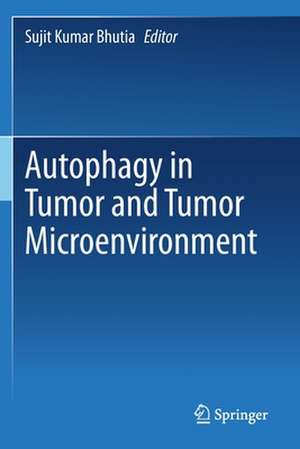Autophagy in tumor and tumor microenvironment
Editat de Sujit Kumar Bhutiaen Limba Engleză Paperback – 26 oct 2021
The book elucidates the physiological role of autophagy in modulating cancer metastasis, which is the primary cause of cancer-associated mortality. Further, it reviews its role in the differentiation, development, and activation of multiple immune cells, and its potential applications in tumor immunotherapy. In addition, it examines the effect of epigenetic modifications of autophagy-associated genes in regulating tumor growth and therapeutic response and summarizes autophagy’s role in the development of resistance to a variety of anti-cancer drugs in cancer cells. In closing, it assesses autophagy as a potential therapeutic target for cancer treatment. Given its scope, the book offers avaluable asset for all oncologists and researchers who wish to understand the potential role of autophagy in tumor biology.
| Toate formatele și edițiile | Preț | Express |
|---|---|---|
| Paperback (1) | 715.35 lei 43-57 zile | |
| Springer Nature Singapore – 26 oct 2021 | 715.35 lei 43-57 zile | |
| Hardback (1) | 722.33 lei 43-57 zile | |
| Springer Nature Singapore – 25 oct 2020 | 722.33 lei 43-57 zile |
Preț: 715.35 lei
Preț vechi: 753.01 lei
-5% Nou
Puncte Express: 1073
Preț estimativ în valută:
136.88€ • 143.30$ • 113.26£
136.88€ • 143.30$ • 113.26£
Carte tipărită la comandă
Livrare economică 07-21 aprilie
Preluare comenzi: 021 569.72.76
Specificații
ISBN-13: 9789811569326
ISBN-10: 9811569320
Ilustrații: VII, 280 p. 38 illus., 37 illus. in color.
Dimensiuni: 155 x 235 mm
Greutate: 0.41 kg
Ediția:1st ed. 2020
Editura: Springer Nature Singapore
Colecția Springer
Locul publicării:Singapore, Singapore
ISBN-10: 9811569320
Ilustrații: VII, 280 p. 38 illus., 37 illus. in color.
Dimensiuni: 155 x 235 mm
Greutate: 0.41 kg
Ediția:1st ed. 2020
Editura: Springer Nature Singapore
Colecția Springer
Locul publicării:Singapore, Singapore
Cuprins
Chapter 1. Role of xenobiotic in autophagy inflection in cell death and carcinogenesis.- Chapter 2. Autophagy – An agonist and antagonist with an interlink of apoptosis in cancer.- Chapter 3. Cross-talk between DNA damage and autophagy and its implication in cancer therapy.- Chapter 4. miRNAs and its regulatory role on autophagy in tumor microenvironment.- Chapter 5. Exploring the metabolic implications of autophagy modulation in tumor microenvironment.- Chapter 6. Mitophagy and Reverse Warburg Effect: Metabolic Compartmentalization of Tumor Microenvironment.- Chapter 7. Mitochondrial Biogenesis, Mitophagy, and Mitophagic cell death in Cancer Regulation: A Comprehensive Review.- Chapter 8. Mechanical stress-induced autophagy: a key player in cancer metastasis.- Chapter 9. The Interplay of Autophagy and the Immune system in the Tumor Microenvironment.- Chapter 10. Relevance of autophagy in cancer stem cell and therapeutic.- Chapter11. The Autophagy Conundrum in Cancer Development, Progression and Therapeutics.- Chapter 12. Targeting Autophagy in Cancer: Therapeutic implications.- Chapter 13. Mechanistic insights into Autophagosome-Lysosome Fusion in Cancer Therapeutics.
Notă biografică
Sujit Kumar Bhutia is currently working as an Associate Professor at the Department of Life Science, National Institute of Technology in Rourkela, India. He received his doctorate in cell biology and cancer from the Indian Institute of Technology, Kharagpur, India in 2008, and subsequently pursued post-doctoral research on autophagy and cancer at Virginia Commonwealth University, USA. His research interests are focused on understanding the role of autophagy and autophagy-dependent cell death in cancer for the development of novel therapeutics.
He has published more than 80 research articles in international peer-reviewed journals and authored or co-authored numerous books and book chapters. He is also serving as a referee for several international journals. Prof. Bhutia has more than 10 years of teaching experience in the areas of cell biology, cell signaling, cancer biology, and cell death.
He has published more than 80 research articles in international peer-reviewed journals and authored or co-authored numerous books and book chapters. He is also serving as a referee for several international journals. Prof. Bhutia has more than 10 years of teaching experience in the areas of cell biology, cell signaling, cancer biology, and cell death.
Textul de pe ultima copertă
This book deals with the paradoxical role of autophagy in tumor suppression and tumor promotion in cancer cells. Autophagy plays opposing, context-dependent roles in tumors; accordingly, strategies based on inhibiting or stimulating autophagy could offer as potential cancer therapies.
The book elucidates the physiological role of autophagy in modulating cancer metastasis, which is the primary cause of cancer-associated mortality. Further, it reviews its role in the differentiation, development, and activation of multiple immune cells, and its potential applications in tumor immunotherapy. In addition, it examines the effect of epigenetic modifications of autophagy-associated genes in regulating tumor growth and therapeutic response and summarizes autophagy’s role in the development of resistance to a variety of anti-cancer drugs in cancer cells. In closing, it assesses autophagy as a potential therapeutic target for cancer treatment. Given its scope, the book offers a valuable asset for all oncologists and researchers who wish to understand the potential role of autophagy in tumor biology.
The book elucidates the physiological role of autophagy in modulating cancer metastasis, which is the primary cause of cancer-associated mortality. Further, it reviews its role in the differentiation, development, and activation of multiple immune cells, and its potential applications in tumor immunotherapy. In addition, it examines the effect of epigenetic modifications of autophagy-associated genes in regulating tumor growth and therapeutic response and summarizes autophagy’s role in the development of resistance to a variety of anti-cancer drugs in cancer cells. In closing, it assesses autophagy as a potential therapeutic target for cancer treatment. Given its scope, the book offers a valuable asset for all oncologists and researchers who wish to understand the potential role of autophagy in tumor biology.
Caracteristici
Reviews the paradoxical roles of autophagy in tumor suppression and tumor promotion Summarizes the physiological function of autophagy in tumorigenesis, metastasis, targeted-therapy, and drug resistance in cancer cells Examines the critcial role of autophagy in regulating genetics and epigenetics events in tumorigenesis Explores autophagy as a candidate for targeted tumor immunotherapy
